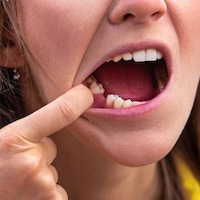I’m Missing Only One Tooth—Why Should I Replace It?
April 15th, 2021
Problems Resulting From Missing Teeth
Missing Bite Action: A full set of teeth in a normal mouth keeps your teeth lined up and in place. A missing tooth can cause a corresponding tooth in the upper or lower arch to extrude and to decay more rapidly since you lose important chewing contact.
Drifting Teeth: Adjacent teeth may shift into the new, open space, resulting in a crooked smile and possible joint pain.
Changes in Facial Structure: Jawbone health is preserved with the pressure from chewing. When this ceases because of missing teeth, you experience issues with jawbone integrity, a phenomenon known as jawbone resorption. Also, over time, gaps in teeth can make your facial muscles droop, making you look older. Delays in addressing the tooth loss may require the need for jawbone grafting surgery before your periodontist can provide dental implants.
Lessened Self-Confidence: Who wants to smile with a gap in your teeth? If chewing and/or speech is affected, both issues which are not uncommon, we can become more self-conscious.
TMJ Issues: Temporomandibular joints (TMJ) disorders are more common when your teeth shift out of position and can cause headaches or other discomfort.
While the front teeth in the smile zone are most visible when we smile, those back molars do most of the leg work for us when we chew. Whether you’re missing a front tooth, a back tooth, or more than one tooth, contact the Pennsylvania Center for Dental Implants and Periodontics. Doctors Philip L. Fava and Robert A. Levine are skilled periodontists with extensive experience and training in dental implant procedures and the treatment of gum disease. To learn more, call our office today at 215-677-8686.
